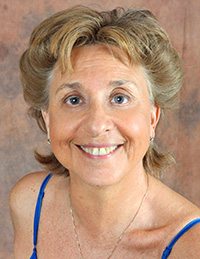Lynne Bernfield does many things and you can find them all here, in the web site which is named for her Internet radio show. Here you can find out about the radio show, and also her psychotherapy practice, her book “When You Can You Will” as well as the audio and workbook she created to go along with it, her work as a consultant to businesses, organizations and boards of directors, her music CD, and whatever else she finds herself doing.
Profile of Lynne from the Longboat Key Observe
Reproduced from the July 21, 2010 Longboat Key Observer and YourObserver.com
Arts anchor
When Lynne Bernfield was 25 years old, she set out to be a songwriter. She took a break from her job as a social worker in New York City, enrolled in a songwriting class and befriended a young composer.
The two wrote a few songs together and auditioned for a prestigious musical comedy workshop founded by Lehman Engel, a Tony Award-winning conductor and composer. They got in.
 A singer and a pianist, Bernfield spent most of the 1970s working feverishly toward this goal. She moved in 1974 to Los Angeles, took odd jobs to pay the bills and penned songs that cut across all genres.
A singer and a pianist, Bernfield spent most of the 1970s working feverishly toward this goal. She moved in 1974 to Los Angeles, took odd jobs to pay the bills and penned songs that cut across all genres.
She yearned for the day she’d turn on the radio and hear one of her tunes playing on a Top 40 countdown, but other than the 1976 track “Good Time to Say Goodbye,” which she co-wrote for country singer Juice Newton, Bernfield’s songwriting career never blossomed.
“Not having made a living off it was OK,” says Bernfield, who for years received $1.25 royalty checks in the mail from the Newton song. “At the time, it was not hard to see publishers and recording engineers. You could feel you were a songwriter even if you didn’t have anything on the charts. I wouldn’t give back those 10 years for anything.”
Bernfield doesn’t have to tell you she’s an optimist. It sneaks up on you in hidden nuggets of rose-colored truths, like the first song on the album she recorded as a birthday present to herself — “Sweet Single Life,” which opens with the line, “I’m so glad to see there ain’t no one but me that I’ve got to satisfy.”
After a decade of songwriting, Bernfield went back to college to get her master’s degree. For 12 years in California, she worked as a licensed marriage, family and child therapist, specializing in the treatment of writers and artists, people with whom she identified.
“There’s an inner tug-of-war with most writers and artists,” Bernfield says. “To begin with, parents will be delighted that their kid can write, draw or dance. ‘Oh that’s adorable,’ they say, followed by, ‘What are you going to do for a living?’ The capacity to commit to the thing is a compulsion. They’re damned if they do and damned if they don’t.”
In 1993, she wrote the book, “When You Can You Will: Why You Can’t Always Do What You Want to Do … And What to Do About It.”
One year later, when an earthquake tore through her Los Angeles neighborhood, she left the West Coast for Siesta Key, where five years earlier she had purchased a home on a canal near The Village.
Curled up cross-legged on a sofa in her sunlit living room, Bernfield is a combination of New-York-street-smart-meets-self-help-therapist-meets-1960s-flower-child.
Though she’s still a practicing therapist, she only meets with clients over the phone now. These days, her focus is on “The Lynne Show,” the Internet radio show she hosts every Tuesday on Radio Ear Network, a global radio station that broadcasts podcasts online.
Just like in her private practice, Bernfield likes to pick the brains of artists and entertainers.
Over the past three years, she’s interviewed actors (Dick Smothers and Carolyn Michel), high-profile music attorneys (The Rolling Stones’ Allen Arrow), jazz musicians (Lillette Jenkins-Wisner, Dick Hyman and John Lamb), artists (Gale Fulton Ross), novelists (Terry Griffin and Stuart Kaminsky) and the artistic directors of almost every performing-arts organization in town (Michael Donald Edwards, Iain Webb and Nate Jacobs).
“They all say the same thing,” Bernfield says. “That their careers happened to them. That it was something they could not help. You find when you interview people who make their living from their art, they are exactly who they are, if that makes sense.”
She pauses to find the right psychotherapeutic term for it, draws a blank and recalls something a children’s cartoon composer once told her — that his life was magical and spiritual.
“For most people, their work is what they do,” Bernfield says. “For writers and artists, their work is who they are.”
A few minutes later, the word comes to her: congruence, which means to be in harmony.
“Most of the people I interview didn’t intend to do what they’re doing,” Bernfield says, unconsciously echoing her own life story. “It’s as though their careers just happened to them.”
